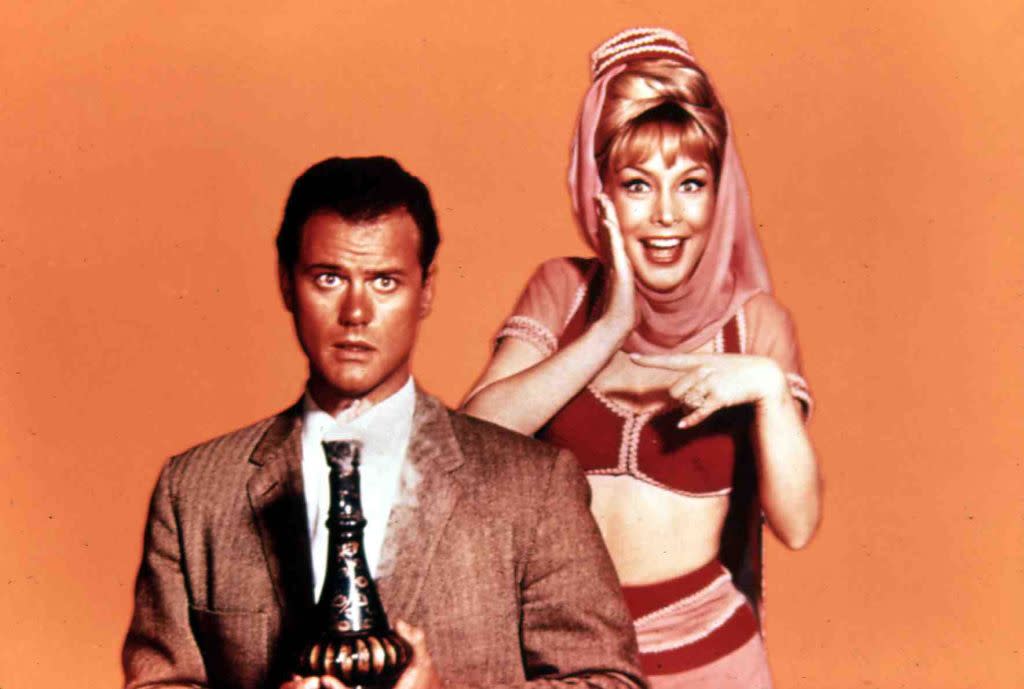'I Dream of Jeannie' at 55: How the popular sitcom captured 'women's increasing restlessness'

The ‘60s sitcom I Dream of Jeannie, about an astronaut (future Dallas villain Larry Hagman) who finds a 2,000-year-old, midriff-baring genie (Barbara Eden) in a bottle in the ocean, seems fluffy — silly even — at first glance. In its time, it was one of several shows that depicted women with magical powers that the men in their lives begged them to keep constrained.
As we mark 55 years since the show debuted on September 18, 1965, author Susan J. Douglas, who wrote Where the Girls Are: Growing Up Female With the Mass Media, explains that there was a lot more going on beneath the surface.
“[I Dream of Jeannie] was really very much of its moment in trying to navigate between these pre-feminist rumblings and still very much wanting to continue to represent women in traditional roles,” Douglas tells Yahoo Entertainment. “[Jeannie] did call him master. She was in love with him. But I think its significance really is in being part of that moment, trying to give metaphorical representation to women’s increasing restlessness.”
Take the first season episode “The Americanization of Jeannie,” which Douglas cites in her book. In it, Jeannie reads a magazine article about how to be an emancipated modern woman. When Hagman’s character, then-Capt. Anthony Nelson, comes home the next night, she struts in wearing curlers in her hair, with no dinner on the table. She calls him “old boy,” instead of the usual “master.” Jeannie even hands him a broom! He demands that she stop reading “subversive literature” and conjure up dinner. Later, Jeannie takes a job doing demos for housewives and, lo and behold, trouble ensues. Nelson saves Jeannie by taking her home and explaining to her that she needs an outlet for her affection. Perhaps a pet?
The second season’s “A Secretary Is Not a Toy” has Jeannie longing for the secretarial job that’s become available at Nelson’s office. She wants to make him look good in front of his boss so he can be promoted. Of course, he’s against this. “Can you imagine her being a secretary and the chaos it would create?” he tells a friend. When Jeannie wins the job anyway, she does indeed cause a ruckus, with most everyone at NASA flirting with her instead of working. Because there’s no background information available on her, the FBI even opens an investigation on the mysterious new employee. Jeannie’s “master” then tricks her into going back home, but she makes sure to get him in trouble with his boss first.
Jeannie hit American screens not long after publication of Betty Friedan’s groundbreaking book The Feminine Mystique, which noted the many ways that women — as critics have since acknowledged, a very specific type of white, middle-class women — were shut out of the world. They were, for example, unable to obtain a credit card without a man as a co-signer and many jobs were off limits to them. They were encouraged and expected to abandon their own hopes and dreams in exchange for a life dedicated solely to taking care of their families. And they were supposed to wear heels, lipstick and a big smile while doing it. The nonfiction page-turner became a bestseller and helped spark the feminist movement of the ‘60s and ‘70s.
I Dream of Jeannie also came along on the heels of Bewitched, a sitcom about a witch who marries an ordinary man and, much to his dismay, has the ability to make magic with the twitch of her nose. That show had been a big hit with audiences, which was no surprise considering what was happening at the time.
“With Bewitched, ABC was in the ratings toilet back then, and all of a sudden, Bewitched comes on and it becomes the No. 2 show in the Nielsens. So what does that mean, in part?” Douglas says. “There were millions of women around the country fantasizing about zapping their kitchens clean and fantasizing about having that kind of power that could eliminate domestic drudgery and that could take you outside of the home.”
Jeannie predated The Flying Nun, in which future Oscar winner Sally Field swooped around solving people’s problems, by two years.
“It’s not that six white guys were sitting around saying, ‘Uh-oh, there’s this movement. What should we do?’” says Douglas, a communications professor at the University of Michigan whose other books include this year’s In Our Prime: How Older Women Are Reinventing the Road Ahead. “But, you know, they’re part of a culture and at that particular time, television was very kitschy. We had martians and talking horses and Munsters… One way of both acknowledging women’s desire for power while keeping them, as Jeannie was, in her bottle, was to give them these magical powers that often, and particularly in I Dream of Jeannie, wreaked havoc.”
So while over-the-top visual effects and the overall silliness of Jeannie made it easy to overlook its significance, the show was actually reflecting people’s anxieties about gender roles and how they were changing.
After five seasons, I Dream of Jeannie was canceled amid falling ratings, after Jeannie and Hagman’s character, who’d by then been promoted to a major, married. The story continued, though, over two TV movies done without Hagman. He and Eden did reunite a few times over the decades on talk shows or on awards shows, before he died of cancer in 2012 at the age of 81.
Over the years, Eden has looked back on the show and explained how she interprets it.
“I never thought Jeannie was sexist. Never, ever. She was a genie! This was her job. And she was happy in her job,” she said on Oprah: Where Are They Now? in August 2016. “She was a very independent creature. And very strong. In fact, I’ve had young women come up to me and say it empowered them.”
Read more from Yahoo Entertainment:


